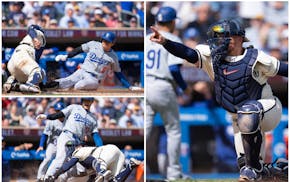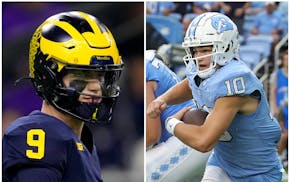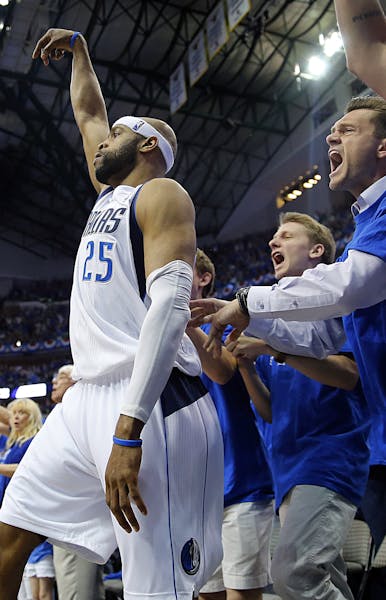Ricky Rubio won't play again in this stink-bomb season, and that's a wise move by the Timberwolves if viewed in the context of their hopeless situation.
The team officially ended Rubio's season Saturday because his injured left ankle is still sore and not responding well to treatment, according to Flip Saunders.
Whether you buy that explanation or remain skeptical about the team's motives, this outcome became inevitable.
Rubio shouldn't risk further damage to his ailing ankle. And the Wolves shouldn't risk possibly screwing up their draft lottery position since they put their fans through misery in pursuit of a top pick.
"I don't think anyone thought it was going to take the turn that it took, and how long for him," Saunders said of Rubio's injury. "They're trying to do some different things to see if they can get him pain-free."
The injury limited Rubio to 22 games, which means he's only played in 202 of a possible 312 games in his four seasons — about 65 percent.
That's a problem.
Rubio turns 25 early next season. He's not old or maybe even entering his prime yet. But he's not a young, unproven player anymore, either.
The meter is running here.
Andrew Wiggins has emerged as the Wolves' best player, but Rubio remains the most important piece. He's their point guard, their leader, and his absence leaves a gigantic void on the court.
The organization showed its faith in Rubio by handing him a four-year, $55 million contract this season. The team can't move forward, though, without Rubio healthy and at his best.
So far, we've seen only glimpses of that.
Not counting the final record, Rubio's lack of development stands as the biggest disappointment in a season that should result in apology letters sent to anyone who walked through the Target Center doors.
Rubio played a career low in games because of that wretched ankle injury. When he did play, he made only 35.6 percent of his shots, a career low. He shot 25.5 percent from three-point range, a career low. He averaged 10.3 points, third lowest in his career.
Players shouldn't be blamed for injuries. That's normally out of their control. But the fact remains: Rubio hasn't proven that he can stay healthy or that he can shoot well enough to be considered a reliable offensive threat.
Those two roadblocks continue to stunt his development at a time when the NBA is stacked with elite point guards. That's the league's best and deepest position, and Rubio acknowledged in a recent conversation that his shooting has prevented him from joining that next tier of point guards.
"I have confidence in me," he said. "I think I can be great in this league. To do that, I need to improve a lot on my shot."
Effort and desire should not be a criticism of Rubio. Spend five minutes around the guy and it's clear that he loves the game and is determined to become a more complete player. The nonsense of this season made him miserable.
Rubio does enough other things that create optimism about his future. He's a great passer. He has terrific court vision. He rebounds, plays solid defense and brings passion.
Now he needs to become a better shooter so opponents will have to respect that part of his game.
The Wolves hired a shooting coach this season, Mike Penberthy, who has spent countless hours working with Rubio individually.
Penberthy described Rubio as "fragile" when they met last summer because he had lost confidence. Penberthy said he believes Rubio's issues have as much to do with his mental approach as flaws in his mechanics.
Rubio looked more confident shooting the ball when he first returned from his injury. He had a quicker release and more arc. But before long his shot went flat again.
"When you become a better shooter, your life changes as a player," Penberthy said. "All your gifts will start to come out. Your passing, your driving, you'll become quicker because guys will guard you closer."
Rubio and Penberthy returned to Target Center every night possible during the season for shooting work, even when he was sidelined by his injury. They focused on improving his balance, his pace coming off screens and developing a quicker release.
"He works harder than anybody I've ever worked with," Penberthy said.
And yet he's still so inconsistent in games. Penberthy believes the payoff will come next season because he doesn't think Rubio ever fully regained his leg strength after he returned.
A career 36.7 percent shooter, Rubio needs to move that mark above 40 percent to make opponents respect his shot.
To do that, he needs to stay healthy.
Those two concerns continue to hang over his head after what amounts to a lost season.
Chip Scoggins chip.scoggins@startribune.com

Scoggins: Finch feeling heat of the Suns as playoff battle looms
Scoggins: Why 'championship or bust' fits these Wolves

Scoggins: Anatomy of a game-saving play as Correa throws out Ohtani


